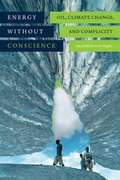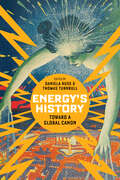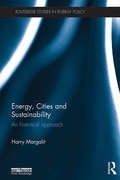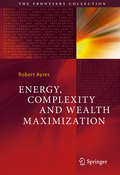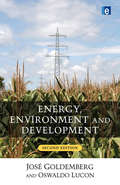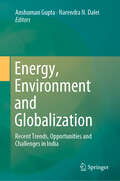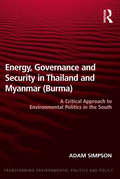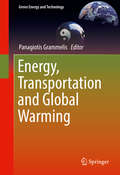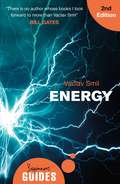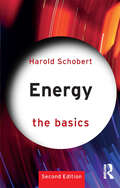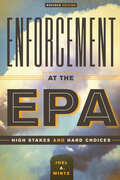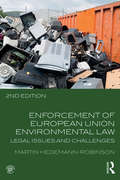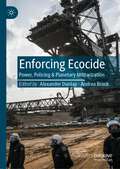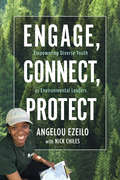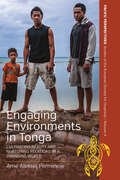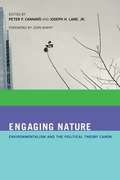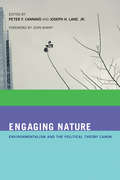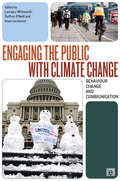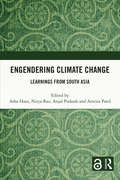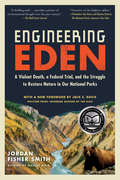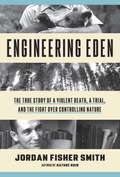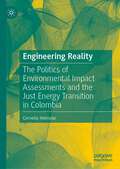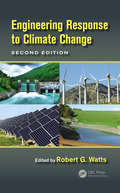- Table View
- List View
Energy without Conscience: Oil, Climate Change, and Complicity
by David Mcdermott HughesIn Energy without Conscience David McDermott Hughes investigates why climate change has yet to be seen as a moral issue. He examines the forces that render the use of fossil fuels ordinary and therefore exempt from ethical evaluation. Hughes centers his analysis on Trinidad and Tobago, which is the world's oldest petro-state, having drilled the first continuously producing oil well in 1866. Marrying historical research with interviews with Trinidadian petroleum scientists, policymakers, technicians, and managers, he draws parallels between Trinidad's eighteenth- and nineteenth-century slave labor energy economy and its contemporary oil industry. Hughes shows how both forms of energy rely upon a complicity that absolves producers and consumers from acknowledging the immoral nature of each. He passionately argues that like slavery, producing oil is a moral choice and that oil is at its most dangerous when it is accepted as an ordinary part of everyday life. Only by rejecting arguments that oil is economically, politically, and technologically necessary, and by acknowledging our complicity in an immoral system, can we stem the damage being done to the planet.
Energy's History: Toward a Global Canon
by Daniela Russ and Thomas TurnbullEnergy history is an approach to understanding the past that takes changes in the human exploitation of Earth's energies as its object of inquiry. This interdisciplinary field documents and analyzes how humans have thought about, harnessed, stored, and exploited stocks and flows of energy. In recent decades, in response to evidence of the effect of fossil fuel use in our climatic system and coinciding with an energy turn across the humanities, a new urgency and purpose has been ascribed to such work. Energy's History challenges abstract and universalizing conceptions of energy's history-making capacities. Each of the twelve essays in this collection presents, analyzes, and contextualizes a primary source. The contributors focus on ideas, events, and statements that recorded and critiqued the distinct historical paths of energy, thereby broadening the scope of where and what constitutes energy history. As energy's world-making has enmeshed ever more of the planet into a dangerous compact with fossil fuels, energy histories must be revised within this new energy-historical reality. This volume both presents persuasive visions of energy-driven development beyond the Western capitalist model and provides an expansive and critical account of the ways in which energy histories have shaped the past and impact the present.
Energy, Cities and Sustainability: An historical approach (Routledge Studies in Energy Policy)
by Harry MargalitAccording to some estimates, humanity has now passed the point at which city dwellers outnumber country dwellers. This simple fact encapsulates a multitude of historical trends and contentions, not the least being "is this sustainable"? Energy, Cities and Sustainability aims to illuminate this question by tracing the evolution of the modern city, the energy sources that power it and the motivations behind increasing urbanisation. The book examines changing energy use across history, analysing the origins and significance of the Industrial Revolution to reveal how the modern city came into being. Transport, population size, housing, electricity use and growing consumption are each discussed, showing how the cultural aspects of energy use have influenced urban form in the developed world and developing countries. Finally, in contemplating the future, it is considered whether this model of modern urban life is sustainable. This book is a valuable resource for researchers, academics and policy-makers in the areas of planning, energy policy and environment and sustainability.
Energy, Complexity and Wealth Maximization
by Robert AyresThis book describes the evolution and mechanisms of natural wealth creation. The author explains how natural wealth consists of complex physical structures of condensed ("frozen") energy and what the key requirements for wealth creation are, namely a change agent, a selection mechanism and a life-extending mechanism. He uses elements from multiple disciplines, from physics to biology to economics to illustrate this. Human wealth is ultimately based on natural wealth, as materials transform into useful artifacts, and as useful information is transmitted by those artifacts when activated by energy. The question is if the new immaterial wealth of ideas of the knowledge economy can replace depleted natural wealth. This book reveals the vital challenge for economic and political leaders to explore how knowledge and natural capital, energy in particular, can interact to power the human wealth engine in the future.
Energy, Environment and Development
by Jose Goldemberg Oswaldo LuconThe relationship between energy and the environment has been the basis of many studies over the years, as has the relationship between energy and development, yet both of these approaches may produce distortions. In the first edition of this book, Professor Goldemberg pioneered the study of all three elements in relation to one another. With contributions from Oswaldo Lucon, this second edition has been expanded and updated to cover how energy is related to the major challenges of sustainability faced by the world today. The book starts by conceptualizing energy, and then relates it to human activities, to existing natural resources and to development indicators. It then covers the main environmental problems, their causes and possible solutions. Disaggregating national populations by income and by how different income groups consume energy, the authors identify the differences between local, regional and global environmental impacts, and can thus ascertain who is responsible for them. Finally, they discuss general and specific policies to promote sustainable development in energy. New coverage is included of today's pressing issues, including security, environmental impact assessment and future climate change/renewable energy regimes. The authors also cover all major new international agreements and technological developments. Energy, Environment and Development is the result of many years of study and practical experience in policy formulation, discussion and implementation in these fields by the authors. Written in a technical yet accessible style, the book is aimed at students on a range of courses, as well as non-energy specialists who desire an overview of recent thought in the area.
Energy, Environment and Globalization: Recent Trends, Opportunities and Challenges in India
by Anshuman Gupta Narendra N. DaleiThis book analyzes contemporary issues relating to energy, environment, and globalization in the Indian context. As a signatory to the Paris climate accord, India has reiterated its commitment to taking strong and positive steps toward climate change mitigation. However, as one of the fastest growing economies in the world, it is battling the effects of a steep rise in fossil fuel usage and pollution. Further, increasing globalization is leading to greater economic activity and production, resulting in additional energy use, which has a negative effect on the environment. The book argues that globalization need not have only a negative environmental impact; it can also have positive impact through the importation of environmentally sound technologies and implementing global compliance standards. The book is divided into three sections: The energy section discusses issues relating to the status of Indian natural gas market and the need for developing an efficient gas market in India; the economics and politics of sustainable energy in India; the challenges of thermal power and significance of clean thermal power generation in India; environmental and policy issues concerning energy use in urban India; the importance of energy use in developing Human Development Index (HDI); and issues relating to renewable energy in India. The environment section then examines topics such as the impact of global warming on local weather by examining the frequency of extreme weather events such as drought and floods, and their impact on farming activities in the Indian state of Odisha; the importance of according the economic value to environmentally significant things like national park , mangroves, etc. for sustainable development; the role of environmental accounting for ecological sustainability and ecotourism; and environmental concerns increasingly gaining traction among the corporate sector for their long-run benefits . Lastly, the third section addresses issues relating to the challenges and opportunities of globalization, such as the interface between globalization and environment; managing India’s business interest in proposing new Bilateral Investment Treaty (BIT); the challenges being faced by Indian exports and their revival; and making Indian SMEs competitive. As such, it is an invaluable resource for policymakers, researchers, practitioners and students in the field of energy, environment and trade economics.
Energy, Governance and Security in Thailand and Myanmar: A Critical Approach to Environmental Politics in the South (Transforming Environmental Politics and Policy #137)
by Adam SimpsonAcross the world states are seeking out new and secure supplies of energy but this search is manifesting itself most visibly in Asia where rapid industrialisation in states such as China and India is fomenting a frantic scramble for energy resources. Due to entrenched societal inequities and widespread authoritarian governance, however, the pursuit of national energy security through transnational energy projects has resulted in devastating impacts on the human and environmental security of local populations. These effects are particularly evident in both Thailand and Myanmar (Burma), which, located at the crossroads of Asia, are increasingly engaged in the cross-border energy trade. Based on extensive fieldwork and theoretical analysis this ground-breaking book proposes a new critical approach to energy and environmental security and explores the important role that both local and transnational environmental movements are playing, in the absence of effective and democratic governments, in providing ’activist environmental governance’ for energy projects throughout the region. By comparing the nature of this activism under two very different political regimes it delivers crucial theoretical insights with both academic and policy implications for the sustainable and equitable development of the South’s natural resources.
Energy, Transportation and Global Warming
by Panagiotis GrammelisThis book presents a holistic view of climate change by examining a number of energy and transportation technologies and their impact on the climate. High-quality technical research results from specific test-cases around the globe are presented, and developments in global warming are discussed, focusing on current emissions policies from air and maritime transport to fossil fuel applications. Novel technologies such as carbon capture and storage are investigated together with the corresponding process and systems analysis, as well as optimization for mitigating CO2 emissions. Water resources management, waste water treatment, and waste management issues are also covered. Finally, biomass, hydrogen and solar energy applications are presented along with some insights on green buildings. Energy, Transportation and Global Warming is of great interest to researchers in the field of renewable and green energy as well as professionals in climate change management, the transportation sector, and environmental policy.
Energy: A Beginner's Guide (Beginner's Guides)
by Vaclav SmilWith one famous equation, E=mc2, Einstein proved all matter can be described as energy. It is everywhere and it is everything. In this newly updated and engaging introduction, renowned scientist Vaclav Smil explores energy in all its facets – from the inner workings of the human body to what we eat, the car we drive and the race for more efficient and eco-friendly fuels. Energy: A Beginner's Guide highlights the importance of energy in both past and present societies, by shedding light on the science behind global warming and efforts to prevent it, and by revealing how our daily decisions affect energy consumption. Whether you're looking for dinner table conversation or to further your own understanding, this book will amaze and inform, uncovering the truths and exposing the myths behind one of the most important concepts in our universe.
Energy: The Basics (The Basics)
by Harold SchobertEnergy: The Basics offers a concise and engaging introduction to energy, answering critical questions and providing accessible definitions of essential concepts and developments in the field.People rarely stop to think about where the energy they use to power their everyday lives comes from and when they do it is often to ask a worried question: is mankind’s energy usage killing the planet? How do we deal with nuclear waste? What happens when the oil runs out? Energy: The Basics answers these questions, but it also does much more. In this engaging yet even-handed introduction, readers are introduced to: the concept of ‘energy’ and what it really means the ways energy is currently generated and the sources used new and emerging energy technologies such as solar power and biofuels the impacts of energy use on the environment including climate change This new edition has been updated throughout and includes a new chapter on energy storage, along with new material on transportation energy and batteries.Featuring explanatory diagrams and an extensive further reading list, this book is the ideal starting point for anyone interested in the impact and future of the world’s energy supply.
Enforcement at the EPA: High Stakes and Hard Choices, Revised Edition
by Joel A. MintzThe only published work that treats the historical evolution of EPA enforcement, this book provides a candid inside glimpse of a crucial aspect of the work of an important federal agency. Based on 190 personal interviews with present and former enforcement officials at EPA, the U.S. Department of Justice, and key congressional staff members—along with extensive research among EPA documents and secondary sources—the book vividly recounts the often tumultuous history of EPA’s enforcement program. It also analyzes some important questions regarding EPA’s institutional relationships and the Agency’s working environment. This revised and updated edition adds substantial new chapters examining EPA enforcement during the Clinton and George W. Bush administrations. Its treatment of issues of civil service decline and the applicability of captive agency theory is also new and original.
Enforcement at the EPA: High Stakes and Hard Choices, Revised Edition
by Joel A. MintzA former EPA chief attorney traces the tumultuous history of the agency&’s enforcement efforts from the Nixon through the second Bush administrations. Based on 190 personal interviews with present and former enforcement officials at EPA, the U.S. Department of Justice, and key congressional staff members—along with extensive research among EPA documents and secondary sources—this book vividly recounts the often-tumultuous history of EPA&’s enforcement program. It also analyzes some important questions regarding EPA&’s institutional relationships and the Agency&’s working environment. This revised and updated edition adds substantial new chapters examining EPA enforcement during the Clinton and George W. Bush administrations. Its treatment of issues of civil service decline and the applicability of captive agency theory is also new and original. The first published work to treat the historical evolution of EPA enforcement, this book provides a candid inside glimpse of a crucial aspect of the work of an important federal agency. &“Explores the agency&’s strengths and weaknesses . . . With insight and intimate knowledge of enforcement and compliance, Mintz relates an interesting story.&” —Ecology Law Quarterly
Enforcement of European Union Environmental Law: Legal Issues and Challenges
by Martin Hedemann-RobinsonOffering a detailed account of the various legal arrangements at European Union level, this book is an ideal reference tool for practitioners and legal scholars. As well as examining the principal sources of EU environmental law enforcement, it also contributes to the legal and political debates that surround the subject. Spanning three parts, the author examines the practical impact of the legal arrangements at Union level that are used to uphold EU environmental norms. Offering a comprehensive account of the current state of EU environmental law enforcement and the developments affecting it, Martin Hedemann-Robinson explores the role of the European Commission, the possibilities for private law enforcement, and the responsibilities of member state national authorities. Key legal developments that have occurred since the first edition have been incorporated, including new statutory developments and case law. Particular attention is paid to the impact of the 2007 Lisbon Treaty on foundational EU treaty provisions enabling the European Commission to take legal action against EU member states infringing Union environmental law, the establishment of a new legal architecture at Union level on the topic of environmental criminal policy, as well as increased EU legislative intervention in the area of environmental inspections. The impact of the 1998 Århus Convention on EU environmental law enforcement is also addressed in detail, including the influence of recommendations of the Århus Convention’s Compliance Committee.
Enforcing Ecocide: Power, Policing & Planetary Militarization
by Alexander Dunlap Andrea BrockPolicing and ecological crises – and all the inequalities, discrimination, and violence they entail – are pressing contemporary problems. Ecological degradation, biodiversity loss, and climate change threaten local communities and ecosystems, and, cumulatively, the planet as a whole. Police brutality, wars, paramilitarism, private security operations, and securitization more widely impact people – especially people of colour – and habitats. This edited collection explores their relationship, and investigates the numerous ways in which police, security, and military forces intersect with, reinforce, and facilitate ecological and climate catastrophe. Employing a case study-based approach, the book examines the relationships and entanglements between policing and ecosystems, revealing the intimate connection between political violence and ecological degradation.
Engage, Connect, Protect: Empowering Diverse Youth as Environmental Leaders
by Nick Chiles Angelou Ezeilo“Ezeilo artfully articulates the obscured problem of racism in the country’s environmental movement and unapologetically sets forth solutions.” —Elaine Brown, author of A Taste of PowerRevealing the deep and abiding interest that African American, Latino, and Native American communities—many of whom live in degraded and polluted parts of the country—have in our collective environment, Engage, Connect, Protect is part eye-opening critique of the cultural divide in environmentalism, part biography of a leading social entrepreneur, and part practical toolkit for engaging diverse youth. It covers:Why communities of color are largely unrecognized in the environmental movementHow to bridge the cultural divide and activate a new generation of environmental stewardsA curriculum for engaging diverse youth and young adults through culturally appropriate methods and activitiesResources for connecting mainstream America to organizations working with diverse youth within environmental projects, training, and employmentEngage, Connect, Protect is a wake-up call for businesses, activists, educators, and policymakers to recognize the work of grassroots activists in diverse communities and create opportunities for engaging with diverse youth as the next generation of environmental stewards, while the concern about the state of our land, air, and water continues to grow.“An accessible guide to respond to the inequities faced by persons of color marginalized by mainstream environmentalism.” —Dianne D. Glave, author of Rooted in the Earth“Highlights the cultural connection to nature that black and brown people have always had, and the need, for the sake of our physical, mental, and spiritual health, for it to be reclaimed.” —Kamilah Martin, Vice President at the Jane Goodall Institute
Engaging Environments in Tonga: Cultivating Beauty and Nurturing Relations in a Changing World (Pacific Perspectives: Studies of the European Society for Oceanists #9)
by Arne Aleksej PerminowOn March 11, 2011, a tsunami warning was issued for Tonga in Polynesia. On the low and small island of Kotu, people were unperturbed in the face of impending catastrophe. The book starts out from the puzzle of peoples’ responses and reactions to this warning as well as their attitudes to a gradual rise of sea level and questions why people seemed so unconcerned about this and the accompanying loss of land. The book is an ethnography of the relationship between people and their environment based on fieldwork over three decades.
Engaging Nature
by Peter F. Cannavò John Barry Joseph H. Lane Jr.Contemporary environmental political theory considers the implications of the environmental crisis for such political concepts as rights, citizenship, justice, democracy, the state, race, class, and gender. As the field has matured, scholars have begun to explore connections between Green Theory and such canonical political thinkers as Plato, Machiavelli, Locke, and Marx. The essays in this volume put important figures from the political theory canon in dialogue with current environmental political theory. It is the first comprehensive volume to bring the insights of Green Theory to bear in reinterpreting these canonical theorists.Individual essays cover such classical figures in Western thought as Aristotle, Hume, Rousseau, Mill, and Burke, but they also depart from the traditional canon to consider Mary Wollstonecraft, W. E. B. Du Bois, Hannah Arendt, and Confucius. Engaging and accessible, the essays also offer original and innovative interpretations that often challenge standard readings of these thinkers. In examining and explicating how these great thinkers of the past viewed the natural world and our relationship with nature, the essays also illuminate our current environmental predicament.Essays onPlato Aristotle Niccolò Machiavelli Thomas Hobbes John Locke David Hume Jean-Jacques Rousseau Edmund Burke Mary Wollstonecraft John Stuart Mill Karl Marx W. E. B. Du Bois Martin Heidegger Hannah Arendt Confucius ContributorsSheryl D. Breen, W. Scott Cameron, Peter F. Cannavò, Joel Jay Kassiola, Joseph H. Lane Jr. Timothy W. Luke, John M. Meyer, Özgüç Orhan, Barbara K. Seeber, Francisco Seijo, Kimberly K. Smith, Piers H. G. Stephens, Zev Trachtenberg, Andrew Valls, Harlan Wilson
Engaging Nature: Environmentalism and the Political Theory Canon (The\mit Press Ser.)
by Jr. Lane Peter F. Cannavò John Barry Joseph H.Essays that put noted political thinkers of the past—including Plato, Machiavelli, Hobbes, Wollstonecraft, Marx, and Confucius—in dialogue with current environmental political theory.Contemporary environmental political theory considers the implications of the environmental crisis for such political concepts as rights, citizenship, justice, democracy, the state, race, class, and gender. As the field has matured, scholars have begun to explore connections between Green Theory and such canonical political thinkers as Plato, Machiavelli, Locke, and Marx. The essays in this volume put important figures from the political theory canon in dialogue with current environmental political theory. It is the first comprehensive volume to bring the insights of Green Theory to bear in reinterpreting these canonical theorists.Individual essays cover such classical figures in Western thought as Aristotle, Hume, Rousseau, Mill, and Burke, but they also depart from the traditional canon to consider Mary Wollstonecraft, W. E. B. Du Bois, Hannah Arendt, and Confucius. Engaging and accessible, the essays also offer original and innovative interpretations that often challenge standard readings of these thinkers. In examining and explicating how these great thinkers of the past viewed the natural world and our relationship with nature, the essays also illuminate our current environmental predicament.Essays onPlato • Aristotle • Niccolò Machiavelli • Thomas Hobbes • John Locke • David Hume • Jean-Jacques Rousseau • Edmund Burke • Mary Wollstonecraft • John Stuart Mill • Karl Marx • W. E. B. Du Bois • Martin Heidegger • Hannah Arendt • Confucius ContributorsSheryl D. Breen, W. Scott Cameron, Peter F. Cannavò, Joel Jay Kassiola, Joseph H. Lane Jr. Timothy W. Luke, John M. Meyer, Özgüç Orhan, Barbara K. Seeber, Francisco Seijo, Kimberly K. Smith, Piers H. G. Stephens, Zev Trachtenberg, Andrew Valls, Harlan Wilson
Engaging the Everyday: Environmental Social Criticism and the Resonance Dilemma
by John M. MeyerAn argument that environmental challenges will only resonate with citizens of affluent postindustrial countries if sustainability concerns emerge from everyday practices. Far-reaching efforts to address environmental issues rarely seem to resonate with citizens of the United States or other wealthy postindustrial societies. In Engaging the Everyday, John Meyer considers this impediment to action on environmental problems—which he terms “the resonance dilemma”—and argues that an environmental agenda that emerges from everyday concerns would resonate more deeply with ordinary citizens. Meyer explores the contours of this alternative, theorizing both obstacles and opportunities and then considering it in terms of three everyday areas of material practice: land use, transportation by automobile, and home dwelling. Adopting the stance of an “inside critic” (neither detached theorist nor narrow policy advocate), and taking an approach that he calls “contested materiality,” Meyer draws on a variety of theoretical perspectives to construct a framework for understanding material practices. He reimagines each of the three material practices in terms of a political idea: for land, property; for automobiles, freedom; and for homes, citizenship. His innovative analysis offers a grounded basis for reshaping our talk about political concepts and values.
Engaging the Public with Climate Change: Behaviour Change and Communication
by Lorraine Whitmarsh Irene Lorenzoni Saffron O'NeillDespite increasing public awareness of climate change, our behaviours relating to consumption and energy use remain largely unchanged. This book answers the urgent call for effective engagement methods to foster sustainable lifestyles, community action, and social change. Written by practitioners and academics, the chapters combine theoretical perspectives with case studies and practical guidance, examining what works and what doesn't, and providing transferable lessons for future engagement approaches. Showcasing innovative thought and approaches from around the world, this book is essential reading for anyone working to foster real and lasting behavioural and social change.
Engendering Climate Change: Learnings from South Asia
by Anjal Prakash Asha Hans Nitya Rao Amrita PatelThis book focuses on the gendered experiences of environmental change across different geographies and social contexts in South Asia and on diverse strategies of adapting to climate variability. The book analyzes how changes in rainfall patterns, floods, droughts, heatwaves and landslides affect those who are directly dependent on the agrarian economy. It examines the socio-economic pressures, including the increase in women’s work burdens both in production and reproduction on gender relations. It also examines coping mechanisms such as male migration and the formation of women’s collectives which create space for agency and change in rigid social relations. The volume looks at perspectives from India, Pakistan, Bangladesh and Nepal to present the nuances of gender relations across borders along with similarities and differences across geographical,socio-cultural and policy contexts. This book will be of interest to researchers and students of sociology, development, gender, economics, environmental studies and South Asian studies. It will also be useful for policymakers, NGOs and think tanks working in the areas of gender, climate change and development.
Engineering Eden: A Violent Death, a Federal Trial, and the Struggle to Restore Nature in Our National Parks
by Jordan Fisher Smith“Weaves together a dramatic court case in Los Angeles, a grizzly-bear attack, and a surprisingly fascinating debate . . . a thrilling read.” —The Wall Street JournalWinner of the California Book Award, Silver Medal for NonfictionLonglisted for the PEN/E.O. Wilson Award for Literary Science WritingOne of Outside magazine’s 10 Outdoor Books that Shaped the Last DecadeIn the summer of 1972, twenty-five-year-old Harry Eugene Walker hitchhiked away from his family’s northern Alabama dairy farm to see America. Nineteen days later, he was killed by an endangered grizzly bear in Yellowstone National Park. The ensuing civil trial, brought against the US Department of the Interior for alleged mismanagement of the park’s grizzly population, emerged as a referendum on how America’s most beloved wild places should be conserved. Two of the twentieth century’s greatest wildlife biologists testified—on opposite sides.Moving across decades and among Yellowstone, Yosemite, Glacier, and Sequoia National Parks, former park ranger Jordan Fisher Smith has crafted an epic, emotionally wrenching account of America’s fraught, century-and-a-half-long attempt to remake Eden—in the name of saving it.“This meticulously investigated history of Yellowstone and its wildlife management problems should appeal to fans of Jack Olsen’s classic Night of the Grizzlies.” —Library Journal“A wonderful book . . . Smith uses [Walker’s death] as a narrative focal point to explore science, policy making, bureaucracy, ego, even the law, and when he explores something he goes deep.” —John M. Barry, #1 New York Times–bestselling author of The Great Influenza“First-rate storytelling.” —Seattle Times
Engineering Eden: The True Story of a Violent Death, a Trial, and the Fight over Controlling Nature
by Jordan Fisher SmithThe fascinating story of a trial that opened a window onto the century-long battle to control nature in the national parks. When twenty-five-year-old Harry Walker was killed by a bear in Yellowstone Park in 1972, the civil trial prompted by his death became a proxy for bigger questions about American wilderness management that had been boiling for a century. At immediate issue was whether the Park Service should have done more to keep bears away from humans, but what was revealed as the trial unfolded was just how fruitless our efforts to regulate nature in the parks had always been. The proceedings drew to the witness stand some of the most important figures in twentieth century wilderness management, including the eminent zoologist A. Starker Leopold, who had produced a landmark conservationist document in the 1950s, and all-American twin researchers John and Frank Craighead, who ran groundbreaking bear studies at Yellowstone. Their testimony would help decide whether the government owed the Walker family restitution for Harry's death, but it would also illuminate decades of patchwork efforts to preserve an idea of nature that had never existed in the first place. In this remarkable excavation of American environmental history, nature writer and former park ranger Jordan Fisher Smith uses Harry Walker's story to tell the larger narrative of the futile, sometimes fatal, attempts to remake wilderness in the name of preserving it. Tracing a course from the founding of the national parks through the tangled twentieth-century growth of the conservationist movement, Smith gives the lie to the portrayal of national parks as Edenic wonderlands unspoiled until the arrival of Europeans, and shows how virtually every attempt to manage nature in the parks has only created cascading effects that require even more management. Moving across time and between Yellowstone, Yosemite, and Glacier national parks, Engineering Eden shows how efforts at wilderness management have always been undone by one fundamental problem--that the idea of what is "wild" dissolves as soon as we begin to examine it, leaving us with little framework to say what wilderness should look like and which human interventions are acceptable in trying to preserve it. In the tradition of John McPhee's The Control of Nature and Alan Burdick's Out of Eden, Jordan Fisher Smith has produced a powerful work of popular science and environmental history, grappling with critical issues that we have even now yet to resolve.
Engineering Reality: The Politics of Environmental Impact Assessments and the Just Energy Transition in Colombia
by Cornelia HelmckeEngineering Reality offers unprecedented insights into the power of environmental impact assessments in engineering a reality favourable to any investment, focusing on the highly contested environmental study of a large hydroelectric dam project in southern Colombia, El Quimbo. The inclusion of environmental impact assessments to project proposals of environmental influence has been an undeniably important step to environmental governance in many countries around the world. Regarding the science behind these studies as objective and their results as the closest in representing reality, however, is misleading. Many activists and scholars made it their mission to uncover the limitations and work towards filling the gaps. Participation processes are considered key to any successful evaluation, but local knowledges and alternative perspectives are still often disqualified through more widely accepted scientific methods. Engineering Reality systematically walks through and accounts for the shortcomings and injustices associated with environmental monitoring. It compares the reality as presented in the dam’s environmental impact study with first-hand accounts from the local and affected populations and observations gathered through two periods of fieldwork in 2012 (before) and 2016-17 (after the dam started operating). It explores how the knowledge of the study was used politically and to what end. Bringing the findings in conversation with the wider environmental impact assessment literature, the book proposes a new framework to assess energy projects -Energy Data Justice- that regards the environmental impact assessment a strictly political tool aimed at reaching the just energy transition in Colombia and worldwide.
Engineering Response to Climate Change
by Robert G. WattsA clear, concise discussion of today's hottest topics in climate change, including adapting to climate change and geo-engineering to mitigate the effects of change, Engineering Response to Climate Change, Second Edition takes on the tough questions of what to do and offers real solutions to the practical problems caused by radical changes in the Ea
